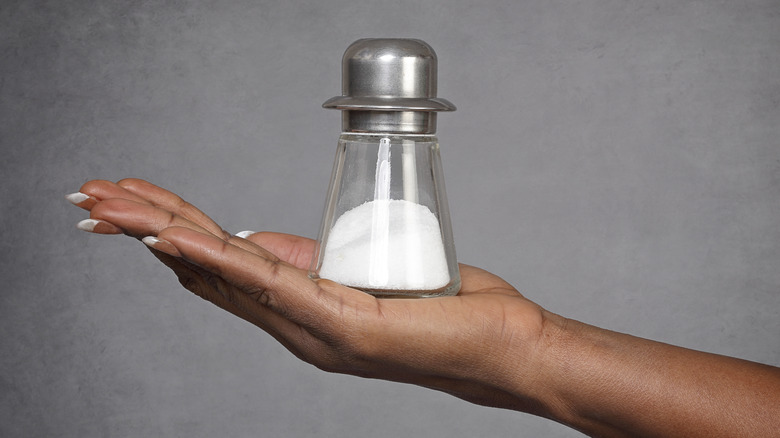Surprising Health Benefits Of Eating Salt
If you love salty food, you're in good company. Statista ranked the United States within the top 10 countries consuming the most salt worldwide in 2019. Additional statistics compiled revealed that Americans consumed 43 million metric tons of salt in 2020. While that's the lowest amount reported since 2016, the data shows that salt consumption in the United States has not seen a significant drop off, consistently remaining within the range of 40 to nearly 50 million metric tons over the past four to five years.
This may sound alarming since salt often gets a bad rap from a health standpoint, but salt is also an essential part of your diet. There are minerals in salt that function as vital electrolytes, which, according to Healthline, help the body maintain healthy nerve and muscle function.
As far as which variety of salt is the healthiest, Healthline reports that they are all roughly about the same. While some varieties may contain calcium, potassium, iron, and zinc, the amounts are inconsequential.
Iodine, or iodide, is an essential mineral that the body needs for a variety of important functions, but is unable to produce on its own (via Verywell Health). Most table salt you find in the U.S. is iodized salt, so making iodine part of your diet is likely not a challenge.
Other health benefits that salt provides
According to Verywell Health, one reason that having salt in your diet is crucial is because iodine is vital for maintaining a healthy thyroid. If you are iodine deficient, this could lead to low production of thyroid hormones and ultimately lead to thyroid disease. Some symptoms of hypothyroidism, or low thyroid function, can include weight gain, low energy, sleepiness, difficulty with focus, and depression. Iodine deficiency could also lead to you developing a goiter, a lump that occurs when your pituitary gland overproduces thyroid stimulating hormone (TSH) to make up for the thyroid's low hormone levels. The result is an overstimulated thyroid gland that cannot properly function.
Besides being an important part of regulating thyroid hormones, salt can also provide a number of topical healing benefits, such as helping to treat canker sores, clearing the nasal passages, and reducing swelling (via WedMD).
While ingesting too much salt is not a good idea, not having an adequate amount of salt in your diet also poses health risks. Avoiding processed foods and adding just enough salt to a healthy meal is a reasonable approach to maintain the optimal iodine levels in your system for your body to function properly.


